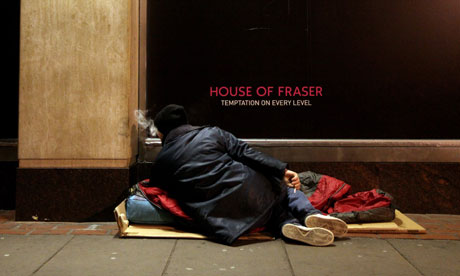Recession and Coronvirus: Where’s the Money Going ?
 THIS week the economic crisis underlying the coronavirus emergency began to tell. The day after the Office for Budget Responsibility raised its estimate for public borrowing this financial year to £300 billion, the Daily Telegraph published a “leaked” Treasury document suggesting this debt explosion would require income-tax rises, a two-year public pay freeze and an end to the triple lock on state pensions. Welcome back austerity.
THIS week the economic crisis underlying the coronavirus emergency began to tell. The day after the Office for Budget Responsibility raised its estimate for public borrowing this financial year to £300 billion, the Daily Telegraph published a “leaked” Treasury document suggesting this debt explosion would require income-tax rises, a two-year public pay freeze and an end to the triple lock on state pensions. Welcome back austerity.*
Of course, the so-called “leak” is a typical kite-flying exercise by Chancellor Rishi Sunak. The Treasury never makes up its mind on budget numbers till closer to the action. Sunak is merely testing the waters to see what he might be able to get away with. Also, there is a bit of “expectations management” about this announcement. The Chancellor is implying fiscal hell to come so he can look good if it is only half as bad.
*
That £300 billion of red ink – the OBR warns it could even be £500 billion in extremis – is mostly the result of tax revenues being hit by the lockdown. However, the initial extra borrowing to cover the shortfall is actually being provided by the Bank of England printing electronic money. Essentially, the Tory Government is “borrowing” from itself. As of now, Sunak has no need to go cap in hand to the markets.
*
Most likely, the Chancellor – a former investment banker and hedge fund operator – is trying to frighten the horses, the better to create pressure for an early return to work. Sunak is more concerned with City profits than the Government’s books. It is noticeable that he is getting a good press – unlike the dithering, poorly-briefed Boris Johnson.
*
Nevertheless, Sunak knows he has a wee tax problem. At the December general election, the Tories pledged in their manifesto not to raise income tax, VAT or National Insurance, and to keep the pensions triple lock. Of course, a pandemic is a sure-fire excuse to dump these promises, especially the triple lock on pensions. Last month, the right-wing Social Market Foundation also called for the triple lock to be scrapped, saying it would save the Chancellor £20 billion over five years. That’s a hefty bit of austerity for pensions.
*
The switch over the last year by pro-market heads of government (Trump, May, Johnson) to promoting extra infrastructure spending by the state is not a signal that austerity has been dumped as a policy. They are merely responding to the collapse in private investment spending since the 2008 banking crisis, which has led to a flat-lining of productivity in many Western capitalist economies. The rise in public investment is designed to bail out global capitalism, not to benefit ordinary folk. Austerity in the shape of cuts to wages and welfare spending, plus tax rises, is still very much on the cards – and COVID-19 will be the convenient justification.
*
WHAT’S THE MONEY GOING ON?
*
Meanwhile, the Chancellor can claim he is being Father Christmas by extending the job retention scheme till October. Just how much will this cost the Treasury? As of 12 May, the Treasury indicates that claims under the job retention measure had reached £10.1bn. Scaling this figure till the end of October indicates a total cost of £40-45bn. However, if the number of people applying under the scheme increases, that bill will rise. The respected Resolution Foundation is predicting that if the crisis is prolonged then up to 11 million employees could apply – up from 7.5 million. So we could be looking at £80 to £100 billion in total.
*
Here’s the skinny. Even at the upper bound of £100 billion to support furloughed workers, that sum is a tiny fraction od the £1.2 trillion that both Labour and Tory governments forked out to save the big banks, following the 2008 financial meltdown. Even if you add in the £350 billion the Chancellor is spending on directly supporting companies during the lockdown, the banks got three times as much in total to protect their arses.
*
 TROUBLE AT HOME
TROUBLE AT HOME*
A chunk of Chancellor Rishi’s support for businesses under lockdown goes to the Scottish Government as Barnett consequentials. Holyrood gets roughly its population share equivalent of the extra spending made in England, as a result of the coronavirus emergency. The Scottish Government has chosen to spend this extra cash very much in line with the rUK allocations, though it has offered extra money for sectors that have proportionately greater importance in the local economy, e.g. tourism and fishing.
*
However, there’s a problem Houston!
*
The tax revenue forecasts that underpin the Scottish Government’s pre-virus spending plans are in tatters, as a result of the recession caused by the medical emergency. Normal Scottish Government revenues from income tax and LBTT (Land and Buildings Transactions Tax) are going to shrink. How is this shortfall to be covered?
*
Under the existing devolved settlement, the Scottish budget is protected against fiscal shocks that are common to both Scotland and rUK – like a pandemic. Any common shortfall is covered by the Treasury. But the Scottish budget is not insured against fiscal risks specific to Scotland – that’s Holyrood’s problem under the devolved straight jacket. So, any divergent cash shortfall that Scotland suffers as a result of Covid-19 has to be paid for here.
*
As we know, the Scottish economy is relatively more reliant on tourism, hospitality and energy than rUK. But these are precisely the sectors likely to be hardest hit by the lockdown. Which means Scottish income tax revenues are likely to fall in these particular sectors proportionately more than in rUK. And it is this difference that the Scottish Government will have to meet on its own.
*
Under the rules, any decline in this year’s forecast income tax revenues impacts on next year’s Scottish budget. At that point, the Scottish Government will have to make up any shortfall by raising taxes, cutting spending, or borrowing. However, the margin for extra borrowing is quite narrow – the Scottish Government has already borrowed £207m this financial year to cover an income tax forecast error in respect of 2017-18.
*
The respected Institute for Fiscal Studies is calling for the Scottish and Welsh Government to be allowed to borrow more. Our MPs at Westminster should be making this a priority.

Yip it’s tae cement the trade war way Europe, America wants it
“Even if you add in the £350 billion the Chancellor is spending on directly supporting companies during the lockdown, the banks got three times as much”
Did the UK Govt not guarantee the loan book of the big banks and then nationalise them (in the case of RBS) As they still hold shares in RBS and I think they have sold the Lloyds ones.
I don’t know what you would rather the Govt do, borrow money like 300 billion from the Saudis or the Chinese? or print it,
They seem to be printing it, which will devalue the pound a good bit in the coming months and years.
Which will impact on everyone from those who holiday abroad regularly, to those who buy food (as most is imported) . It will however make our exports cheaper and attractive to foreigners.
Indeed Scotland’s economy is Tourism so unfortunately they wont be able to capitalise on the flood of folk looking for a cheap holiday.
Likewise Oil in the doldrums.
Fishing may benefit , as cheap food is always in demand in the EU.
It does look a grim outlook for Scotland’s economy alright.
Of course the tourism industry has been badly hit.
However, even if and when all the covid19 restrictions are lifted many people, particularly cash rich older people, will avoid foreign travel so Scotland could benefit from a domestic tourism boost over the medium term.
Aye, and it’s likely that aeroplane travel will become too pricey for a lot of people because of the number of companies going bust too. It would be marvellous if folk were also to simply choose not to travel overseas and to have holidays at home in the interests of protecting the climate, because if people don’t change their behaviour and simply go back to consuming and polluting as before there’ll barely be anything left for an independent Scottish population to enjoy. We’ll be too busy trying to feed ourselves and the millions of climate refugees from countries that have become too parched for anyone to live there.
So, forget the package holidays and visit the parts of Scotland you’ve never seen before instead, and you’ll be protecting the planet and our economy at the same time.